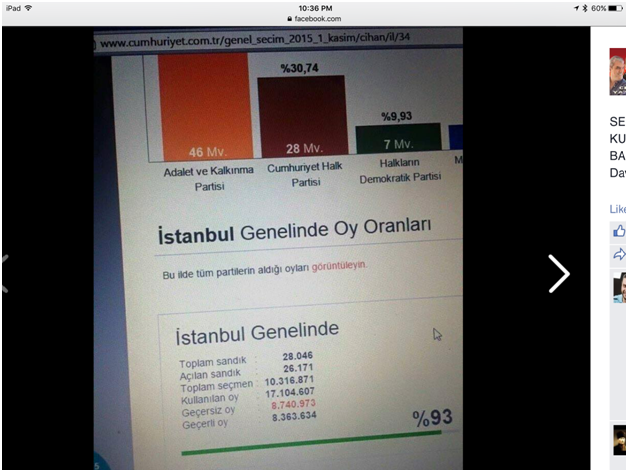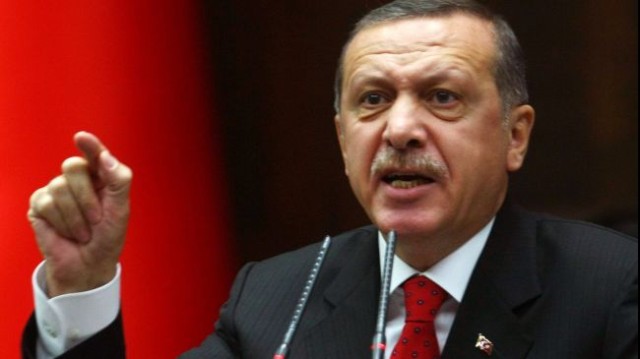Election Fraud in Turkey: Erdogan’s Ballot Stuffing ‘Victory’
Turkish President Erdogan was handed an electoral defeat on June 1st, losing his AKP super majority in the Ankara parliament offset by seats won by the opposition, notably the 13 percent assumed by the Kurdish led-HDP. The question was what he would do after he stiff armed opposition participation in a possible ruling coalition, opting instead for a care taker government. That and calling for a snap election on November 1st hoping that things would improve. In the interim Erdogan attacked the Kurdish PKK inside Turkey, bombed allied PKK forces in Iraq and Syria and declared virtual martial law in largely Kurdish southeastern Turkey. October 10th witnessed twin blasts at a peace rally in Ankara with HDP leadership killing over 102 and injuring several hundred. A rally notably without the usual heavy security details. PM Davutoglu declared it an act by ISIS; others suggested it may have been the work of Turkish intelligence. The polls taking over the run up to the election showed that the opposition would possible block an AKP resurgence. The answer came on November 1st with what some observed as a ‘surprise victory’ for this Islamist regime seeking to create a neo-Ottoman Caliphate. It was an apparent victory built on evident ballot fraud.
My usual astute European observer of things in Turkey sent me this comment in an email on Sunday, November 1st:
The election results were a shock to many and although the election authority was giving partial results for a while at about 19.30 Turkish time they closed the site and might have manipulated the outcome of the votes to bring out the actual results. Of course, this is a supposition among many others.
P.M. Davutoglu has already come out with a declaration that they have to change the constitution to a executive presidential one. Time will tell us how extremist the country will become.

Picture of Istanbul vote count November 1, 2015.
That was followed by an email from “Erdogan Failure” presenting evidence in the accompanying picture of what could be ballot stuffing in Erdogan’s stronghold of Istanbul:
It seems that by 1030 PM last night, each individual Turkish voter in Istanbul cast 1.66 votes. (Meaning: 10,316,871 voters cast 17,104,607 votes in Istanbul.)
How interesting! Where did the additional 6,787,736 come from and from whom did they vote? Maybe some dead people might have voted as well.
Or maybe just that our schools have flunked teaching math to our government’s employees.
Now, we are also attaching another image from the official Turkish government website. It appears that the government realized it was caught lying and then wrote:
25. The election results website is temporarily out of service.
26. Once the election results are finalized, we will publish these results on this site.
How stupid does our government think our people and our foreign friends think we and they are? Will our foreign friends realize that the published results were fraud? Or maybe this is what has happened to our democracy. We have become like our neighbors to the south. God must not love us, because he is humiliating us with this disgrace.
Daniel Pipes posted this on National Review’s The Corner with the apt title, “Turkey’s Election Results Stink of Fraud”
The AKP’s huge increase gave it back the parliamentary majority it had lost in the June 2015 elections, promising President Recep Tayyip Erdogan a semi-legal path to the dictatorial powers he aspires to. But, to me, the results stink of fraud. It defies reason, for example, that the AKP’s war on Kurds would prompt about a quarter of Turkey’s Kurds to abandon the pro-Kurdish party and switch their votes to the AKP. As news of irregularities comes in, Michael Rubin of AEI summed up the problems at Commentary, “Erdogan steals an Election:”
[Something’s rotten in Anatolia. While some Western journalists are describing as “a surprise landslide victory” the decisive win by President Recep Tayyip Erdo?an’s Justice and Development Party (AKP) in Sunday’s election parliamentary election in Turkey, nothing in Turkey today happens by chance. Institutions are so thoroughly corrupted that anyone who considers the results to accurately represent the will of Turks is foolish.]
Back in March 2014 when the AKP appeared to dominate local election results, Rubin wrote, “Did Fraud Sway the Turkish Election:”
Turkish political analysts attribute Erdo?an’s cheating quotient at around 5 percent — that takes into account stuffed ballots, shenanigans on the state-run Turkish Airlines as it transports ballots from abroad, disappeared ballot boxes from opposition-run towns and districts, and pretty much everything involving the mayor of Ankara. In the case of Sunday’s elections, it appears that Erdo?an’s AKP won the votes of hundreds of thousands of dead people.
Given the history of fraud in Turkey’s elections, that this one was rigged comes as no shock, especially as rumors swirled in advance about sophisticated efforts to manipulate the results. The citizens of Turkey now face the decisive question of whether to accept or reject the results of this election. Which will prevail — fear of Erdogan’s ruthlessness or anger at his swindle? Sadly, because his electoral coup d’état has blocked the path of democracy, should Turks resist, they are compelled to do so in non-democratic ways.
Foundation for Defense, non-resident Senior Fellow, a former CHP Republican Former Turkish Parliamentarian, Aykan Erdemir wrote a Politico. EU analysis with the headline, “A defiant Erdogan rides back to power on a wave of violence. Erdemir had six takeaways from Erdogan’s latest dictatorial grab for power:
- Violence wins – a reference to Erodgan’s war against the PKK internally, in Iraq and Syria. Then there is the yet to be disclosed who were behind the October 10th twin blasts in Ankara that killed over 102 and injured more than 400 hundred with no security present at the peace rally led by the Kurdish HDP and trade union allies.
- Turkey descends further into competitive authoritarianism – a score settling crackdown by Erdogan looms against media, businesses and NGO’s denying democratic rights.
- The Peoples’ Democracy Party (HDP) is here to stay – HDP claimed slightly over 10 percent of the 550 parliamentary seats, despite AKP stuffing 1 million ballots switch in Kurdish districts.
- Turkey’s far-right Nationalist Action Party (MHP) has committed suicide – “they lost a quarter of their votes. This, however, was a disaster in the making. Since the June elections, the MHP refused to enter into any coalition, failed to undertake proactive policies and purged most of its competent members from candidate lists.”
- A Pyrrhic victory for the AKP – “If the elections end up highlighting Turkey’s image as a grudgingly democratic authoritarian regime, it could turn into a Pyrrhic victory for the AKP as it suffers the economic costs and political consequences of Turkey’s drift away from the transatlantic world.”
- This could be the beginning of the end for Davitoglu Erodogan duo –“These elections failed to provide Erdo?an with the super-majority he needed to bestow upon himself the executive presidential powers he covets. Prime minister Davuto?lu, however, has won a significant victory, proving his leadership skills and strengthening his credentials within the AKP. If the two fail to arrive at a modus vivendi about the future parameters of power sharing, election celebrations could soon lead to brutal infighting in the AKP ranks, adding further fuel to Turkey’s political chaos and conflict.”
Erdogan received a congratulatory phone call from Chancellor Angela Merkel hoping they can cut a deal for EU funding of Syrian refugee camps and get a sweet Visa deal for Turkish Nationals. The Turkish bourse and Lira foreign exchange may have had a brief spike. However, with a mountain of external debt and rampant inflation, Erdogan may find that foreign investors may not have an appetite for funding his growing autocracy after this election.
EDITORS NOTE: This column originally appeared in the New English Review.


